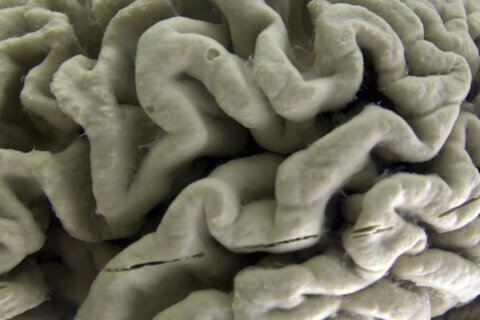For eons, humans have turned to the natural world for remedies to common ailments. Depression is no different, and down the ages, various herbs and other natural products have shown themselves to be helpful in giving a mood boost to people experiencing depression.
When looking for herbs and other natural products for depression that have scientific evidence backing their efficacy, “the list is not that long,” says Dr. Dan Iosifescu, associate professor in the department of psychiatry at NYU Langone Health and director of clinical research at the Nathan Kline Institute for Psychiatric Research in New York.
Natural products that have some evidence backing their claims of helping people with depression include:
— SAMe.
— Other herbs and supplements.
St. John’s Wort
Dr. Samar McCutcheon, a psychiatrist in the department of psychiatry and behavioral health at the Ohio State University Wexner Medical Center in Columbus, says “the most commonly studied herbal supplement in the treatment of depression is St. John’s wort,” a weedy plant with bright yellow flowers native to Eurasia that’s now found all around the world.
Clinical trials “have found it to be effective and relatively well tolerated,” McCutcheon says, “however, St. John’s wort can interact with the metabolism of several other medications, such as blood thinners or oral contraceptives.”
There’s also a concern about using it because “the preparations of St. John’s wort available over-the-counter are not regulated by the (U.S.) Food and Drug Administration to ensure they only include what is on the label — and at the dose listed. We are also unsure of the proper dose for treating depression or the long-term effects of using St. John’s wort,” McCutcheon says.
Iosifescu also notes that beneficial research findings have been in people with mild forms of depression. “The main downside is that it doesn’t really work for any more than relatively mild forms” of the disease. It also “doesn’t get combined very well with standard antidepressants.”
In fact, if you’re already taking an antidepressant, do not add St. John’s wort unless your doctor says otherwise, as there’s a potential for a dangerous interaction. “Unfortunately, you can’t really use St. John’s wort as a booster for antidepressants,” Iosifescu says.
[READ: 7 Tips for Living With Depression.]
Omega-3 Fatty Acids
Another widely available supplement that’s been investigated for its potential ability to support people with depression is omega-3 fatty acids. These compounds are found in plant oils and fatty fish and have been shown to support heart health, immune system function and possibly mood.
Iosifescu says that the data on omegs-3s “is mixed,” so it’s not a certainty that these supplements will help with depression. But for some people, a daily omega-3 supplement might be useful — if not for depression, then for its other documented beneficial effects.
Elemental Folate
Elemental folate is “an active form of folic acid, which is one of the B vitamins” Iosifescu says. Folate is found in leafy green vegetables, citrus fruits and beans.
An established body of science has identified folate, or vitamin B9, as being important for pregnant women to prevent miscarriage and birth defects. There’s also been some indication that it could help protect against heart disease, stroke and some cancers.
Research has suggested that low levels of folate may be more common in people with schizophrenia, depression and bipolar disorder and that having low levels of folate in the blood could hinder the ability of antidepressant medications to do their job.
Therefore, it’s been theorized that adding an elemental folate supplement to boost the performance of antidepressant medications could be useful. Results of studies looking at whether this is true have been mixed so far, but research continues.
It’s important to note that folate deficiencies are relatively rare in the United States. Since 1998, all flour sold in the United States has been fortified with folic acid, a synthetic form of vitamin B9. However, certain medical conditions can prevent the absorption of folate and folic acid, and people who have eliminated all flour from the diet, such as when following a gluten-free diet, won’t benefit from fortified flour.
[READ: Coping With Different Types of Depression.]
SAMe
Sold as a dietary supplement in pill form, S-Adenosyl-L-methionine, also called S-adenosylmethionine, is a chemical compound that’s been studied for its effects on depression. Iosifescu says “there’s relatively strong data” for its efficacy in treating depression.
The National Center for Complementary and Integrative Health in the National Institutes of Health report that people with bipolar disorder should not take SAMe for depressive symptoms except when advised to do so by their doctor because SAMe could actually worsen symptoms of mania.
SAMe has also been found to interact with other medications used to treat depression, including prescription antidepressants and St. John’s wort. It also appears to interfere with the function of another drug called levodopa, or L-dopa, which is used to treat Parkinson’s disease.
Vitamin D
Vitamin D, also called the sunshine vitamin, is made by the skin when exposed to ultraviolet radiation. It’s essential for keeping bones healthy and strong, allowing cells to grow properly and supporting a healthy immune system. It’s such an important nutrient that much of the milk sold in the United States is fortified with it.
There’s also some evidence that vitamin D supports healthy brain function and deficiencies might contribute to the development of depression or other mental illnesses.
Iosifescu says “there’s a lot of data out there about vitamin D and depression, and it’s very mixed. Perhaps giving people mega-doses of vitamin D would help, but it doesn’t really seem to necessarily be the case.”
If you have a documented vitamin D deficiency, your doctor will likely recommend adding a supplement, and you might experience some mood improvement. Getting outside and getting about 10 to 15 minutes of sunlight a day can also boost the levels of vitamin D your body makes naturally.
Other Herbs and Supplements
Ariane Ling, a clinical psychologist at the Steven A. Cohen Military Family Center at NYU Langone Health in New York says traditional Chinese medicine practitioners use a wide variety of herbs to help people deal with a range of conditions, including depression. Studies are ongoing into exactly how herbs, acupuncture and other tools used in this ancient practice work, but a growing body of evidence suggests that there’s something to it. Talk with your health care provider if you’re interested in pursuing alternative treatment options for any medical condition.
Similarly, McCutcheon says there have been some studies that have looked at adding various mineral supplements such as zinc and creatine to help people respond to prescription antidepressants faster or more effectively. But again, “the results have been mixed.”
Should You Use a Natural Remedy for Depression?
There are several reasons to hesitate before trying a natural remedy for depression, and the first of these is the question about what’s really in the bottle, Iosifescu says. Relating it to the concept of terroir in wine making — or how the local environment can greatly determine the composition and quality of the end product — “there’s a lot of variability that’s inherent to these natural products. And when you’re trying to make a medication out of this” that variability can make for a complex undertaking and big differences from brand to brand and even batch to batch.
There’s also a question about what’s actually contained in the bottle. Supplements and other natural products are not evaluated by the FDA, and thus, there’s little guarantee you’re getting what you pay for. Plus, there’s always a risk of contamination.
Another issue is time. “One of the problems with these natural remedies is they don’t work right away,” Iosifescu says. “We as individuals are primed to look for relatively quick effects,” but it can take three months or more of daily use of St. John’s wort, for example, before benefits become apparent.
Because of that and the risks of potential negative interaction between supplements and prescriptions, McCutcheon emphasizes that “it’s always important to consult with your provider first before taking a supplement with your antidepressant.”
Iosifescu agrees. “If given the choice, I would much prefer that they try those things under the supervision and with the help of a clinician.”
And McCutcheon adds, “keep in mind that if a treatment option does not require a prescription, that doesn’t necessarily mean it’s safe or the right option for you. I encourage everyone to keep an open dialogue with their treatment providers so that together you can discuss the risks and benefits of any options you may be considering to treat your symptoms.”
Other Non-Pharmacological Interventions
“Depression is an illness that robs you of your ability to do the things that you want to do,” Ling says. But therapy and behavioral changes can help you manage your symptoms better. These interventions are often the go-to for people who have depression. And there’s lots of evidence that these approaches work.
With talk therapy, you’re working through the issues that may be contributing to your feelings of depression. You’ll also be learning how to change your mindset and alter your response to those feelings. It’s not always easy, and it might take a while for therapy to work.
However, “in some cases, psychotherapy can be equally or more effective than medication,” McCutcheon says. And alternate treatments like bright light therapy can also be deployed to effective ends in some people, “particularly if the symptoms occur with a seasonal pattern.”
Lifestyle interventions that have been proven effective in treating many people with depression include:
— Practicing good sleep hygiene.
— Avoiding alcohol or illicit drugs.
— Getting routine aerobic exercise.
— Eating a healthy diet.
— Engaging with your social support network.
Ling also recommends yoga, meditation and other mindfulness practices to help ease depression.
[SEE: 8 Things You Should Know About Anxiety Medicine.]
Removing the Stigma of Mental Health
Some people may think they need to go it alone or struggle with depression on their own because they feel embarrassed about reaching out for help. But Ling says it’s important to push back against this stigma.
“There’s a practice and a field that supports you. You wouldn’t hesitate to seek help with a cavity or cancer,” so why would you hesitate to ask for help with depression?
For some people, focusing on the physical manifestations of depression helps them overcome that hurdle and put depression back in the realm of the body. “Sometimes it’s easier to talk about what’s happening in someone’s body than someone’s psyche,” Ling says.
Expressing symptoms, such as constant fatigue, headaches, poor appetite or overeating, can help you remember that even though depression starts in the mind, it has a widespread impact on the entire body.
Lastly, Ling notes that “we need to give permission to people who are struggling” to seek help, especially during the pandemic when everyone is dealing with so much. “We all deserve a space to really work on ourselves.”
The good news is that help is available. Ling recommends reaching out through your health insurance company, an online search for local mental health clinicians in your zip code or your primary care provider. “You don’t have to be suffering or feeling very lost.”
And if you’re in crisis, please call the Substance Abuse and Mental Health Services Administration’s national hotline at 1-800-662-HELP (4357).
More from U.S. News
Top Medications for Depression
Best Foods to Eat for Your Mood — and a Few Bad Ones
What Not to Say to Someone With Depression
Can Herbs and Other Supplements Treat Depression? originally appeared on usnews.com
Update 06/23/21: This story was previously published at an earlier date and has been updated with new information.







